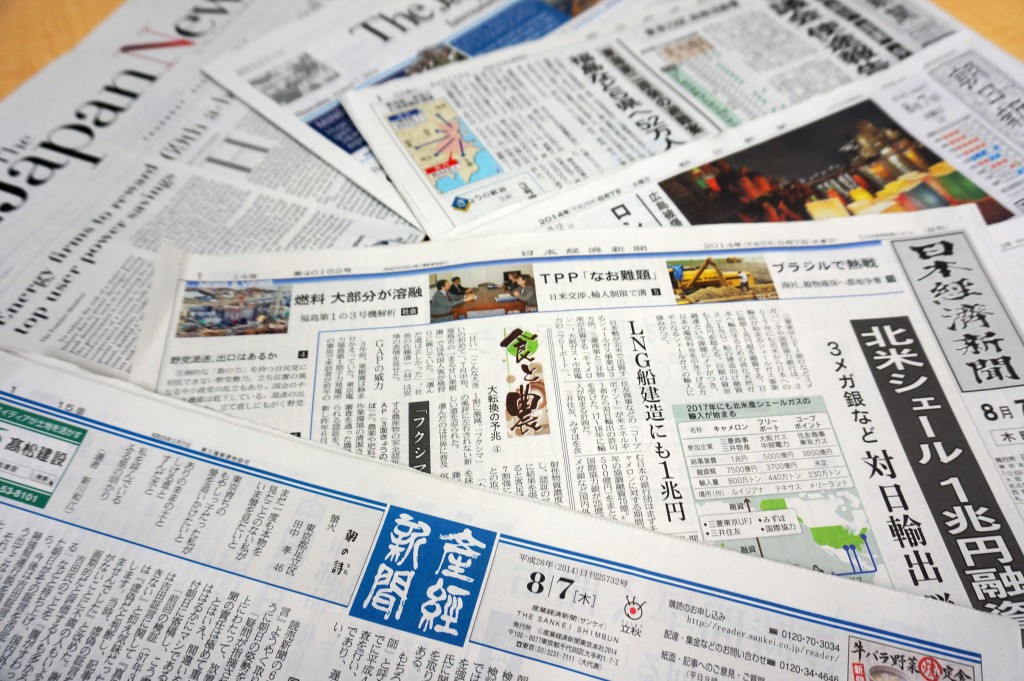A summary of editorials from leading Japanese newspapers (February 23, 2015)
The government adopted a new outline for Japan’s official development assistance on Feb. 20, paving the way for the nation to assist foreign militaries’ activities in nonmilitary missions, such as disaster relief, on a case-by-case basis.
The Development Cooperation Charter, which will replace the current ODA Charter, puts more emphasis on the strategic use of assistance in line with Japan’s diplomatic policy and stipulates for the first time that the aid should help Japan secure its national interests.
Four national dailies wrote about the new outline: The Asahi Shimbun, The Nihon Keizai Shimbun (Nikkei) and The Yomiuri Shimbun on Feb. 11 and The Mainichi Shimbun on Feb. 16. While The Asahi expressed concerns about the new outline, The Nikkei and The Yomiuri supported the new ODA policy as “appropriate.” The Mainichi, meanwhile, extensively discussed another plan being studied to provide military equipment under what the newspaper called a “military version of ODA.”
ODA for nonmilitary activities
The Yomiuri hailed the extension of assistance to the nonmilitary activities of armed forces, saying the policy is “reasonable as the charter has taken into account the current situation in which military forces are lately assuming a larger role in such activities as disaster relief operations and disaster recovery and in helping to deal with infectious diseases.”
“What ODA is supposed to emphasize are the objectives of the assistance, rather than what sort of organization is to be assisted,” The Yomiuri said. “It is not appropriate to uniformly exclude those cases in which military forces are assuming important civil activities.”
The Nihon Keizai Shimbun (Nikkei) said it was understandable for the new charter to allow the provision of ODA to foreign armed forces for nonmilitary purposes. “It is essential for developing countries to ensure the security of their coasts and homelands, …In this respect, we understand the new charter’s purpose of using ODA to secure the public order and security of recipient nations.”
However, there are qualms about this policy, The Nikkei said. “We cannot eliminate the risks of patrol boats provided for maritime policing being used in battles or materials intended for anti-disaster measures being used for military purposes,” it said. “To prevent such a situation from arising, Japan must obtain a pledge from a recipient nation not to use them for military purposes and must also ensure that the verification [of how Japan’s ODA has been used] will be conducted adequately.”
The Asahi, meanwhile, was alarmed by the charter’s partial lifting of the ban on providing assistance to foreign armed forces.
“The new charter says that in nonmilitary situations, such as disaster relief, ‘case-by-case studies will be made in view of the practical significance of the assistance’,” The Asahi said. “But the meaning of ‘practical significance’ is unclear. This indicates that its definition will be largely determined by the government. We are deeply concerned that this could become a loophole for the government to expand assistance to foreign military forces.
“Japan would be exposing itself to future diplomatic problems by leaving any room for suspicions that its assistance may be intended for military purposes.”
National interests
The Yomiuri hailed new initiatives in the new charter to provide assistance to such Gulf nations as the United Arab Emirates and Oman, which have high national income, but are plagued by serious waste disposal problems. “From a viewpoint of securing a stable supply of energy resources, Japan’s deepening relations with the Middle East are of great significance.”
The Asahi, however, expressed misgivings, saying: “It is perfectly natural for the government to use its development cooperation policy as a strategic foreign policy tool. But giving in to a desire to pursue Japan’s short-term ‘national interests’ and becoming thoughtless in choosing Japan’s cooperation partners as a result may well transform the humanitarian nature of the nation’s traditional foreign policy.”
Military version of ODA
The Mainichi focused on another program being considered by the Ministry of Defense to provide defense equipment useful for maintaining maritime security out of its budget to the members of the Association of Southeast Asian Nations.
“We are concerned that such a program will be used as a loophole in Japan’s ODA policy, which has pursued the principles of nonmilitary and pacifism,” The Mainichi said.
“From the view point of taxpayers, there is no difference between ODA and defense ministry budgets when it comes to how tax money is being used. We cannot help but feel anxious that Japan’s military assistance will incrementally increase.”
*English translations of The Yomiuri and The Asahi are from The Japan News and The Asia & Japan Watch, respectively. Those for The Mainichi and The Nikkei are provisional. The content of this page was made by the Foreign Press Center/Japan and does not reflect the opinion of the Japanese Government or any other organization.



